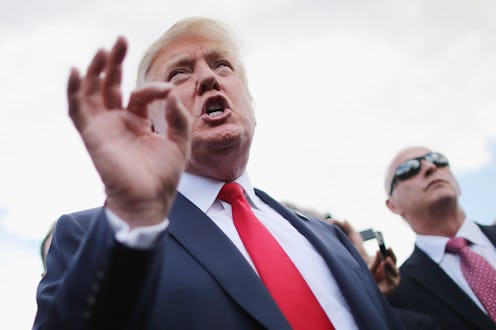News
Can Anyone Actually Stop Trump From Launching Nuclear Missiles?

When Donald Trump was still just another presidential candidate, many questioned whether he could be trusted with nuclear codes. Critics worried that Trump, whose reputation for impulsiveness is well known, wouldn't have the self-control to refrain from pulling the trigger on a nuclear missile strike. Now, Trump is officially president and threatening to meet North Korea "with with fire and fury like the world has never seen." Trump's escalated threats toward North Korea have some asking, who can stop the president from launching nuclear missiles?
The short answer to that question is no one. In theory, a president can launch a nuclear missile without any form of checks or balances. "There is no legal means by which the President's authority to order a nuclear launch is currently checked," Alex Wellerstein, a nuclear weapons historian and Assistant Professor of Science and Technology Studies at the Stevens Institute of Technology, tells Bustle.
Although the procedure put in place to authorize a nuclear missile launch requires secondary confirmation by the secretary of defense under what is known as a two-man rule, the secretary of defense cannot technically prevent the president from ordering a nuclear strike. Moreover, while the secretary of defense could probably, in theory, refuse to carry out the order to launch or resign in protest, they could be fired by the president on the spot. In this way, the defense secretary has the authority to approve the order, but not to question or to veto it.
Recently, Wellerstein has also argued that the secretary of defense is not even a necessary component in the nuclear chain of command. He also notes it would take a fairly wide scale mutiny effort to keep a president from executing a launch.
Although many have questioned it, there's a very specific reason why the president is the only person who can decide if and when nuclear weapons are used. According to Wellerstein, the sole authority to authorize a nuclear missile strike was given to the president during the early stages of the Cold War when, as the United States sought to develop federal laws regarding the use of nuclear weapons, the big fear was trigger-happy generals.
"The motivation for Presidential control was to prevent military control," Wellerstein tells Bustle, adding that the use of nuclear weapons was, at the time, believed to be an inherently political act. "There is some considerable irony, then, that we are now very worried that the U.S. president is not capable of making this decision sensibly, and that the people who hope for some restraint hope it comes from military men."
However, there may be one, very special, circumstances in which a president can be blocked from ordering the launch of a nuclear missile - Section 4 of the Constitution's 25th Amendment. This section of the Constitution outlines the procedure in which the vice president and a majority of Congress or the president's Cabinet could remove the president from office by declaring them "unable to discharge the powers and duties of [the] office." If such a written declaration was approved by the President pro tempore of the Senate and the Speaker of the House of Representatives the vice president would immediately become acting president.
Nuclear weapons expert Bruce G. Blair, who once served as a U.S. Air Force Minuteman intercontinental ballistic missile launch control office and is now a research scholar at Princeton University's Program on Science and Global Security, told Business Insider that Section 4 of the Constitution's 25th Amendment was "the only thing" that could keep the president from authorizing the launch of a nuclear missile and even that would likely have to be done well in advance of a potential nuclear strike threat.
While Wellerstein agrees that invoking the 25th Amendment is one of only two possible ways to potentially stop a president from launching a nuclear missile (the other being an outright extralegal disobeying of the president's order), he's careful to note there's no precedent for such an event. In other words, we may be forced to rely solely on President Trump's discretion when it comes to using nuclear weapons.